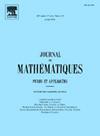Hidden asymptotics for the weak solutions of the strongly stratified Boussinesq system without rotation
IF 2.1
1区 数学
Q1 MATHEMATICS
引用次数: 0
Abstract
The asymptotics of the strongly stratified Boussinesq system when the Froude number goes to zero have been previously investigated, but the resulting limit system surprisingly did not depend on the thermal diffusivity . In this article we obtain richer asymptotics (depending on ) for more general ill-prepared initial data.
As for the rotating fluids system, the only way to reach this limit consists in finding suitable non-conventional initial data: here, to a function classically depending on the full space variable, we add a second one only depending on the vertical coordinate.
Thanks to a refined study of the structure of the limit system and to new adapted Strichartz estimates, we obtain convergence in the context of weak Leray-type solutions providing explicit convergence rates when possible. In the usually simpler case we are able to improve the Strichartz estimates and the convergence rates. The last part of the appendix is devoted to the proof of a new and crucial dispersion estimate, as classical methods fail.
Finally, our theorems can also be rewritten as a global existence result and asymptotic expansion for the classical Boussinesq system near an explicit stationary solution and for large non-conventional vertically stratified initial data.
无旋转强分层Boussinesq系统弱解的隐渐近性
以前已经研究了强分层Boussinesq系统在弗劳德数趋于零时的渐近性,但令人惊讶的是,所得到的极限系统并不依赖于热扩散率ν '。在本文中,我们对更一般的准备不足的初始数据获得了更丰富的渐近性(取决于ν ')。对于旋转流体系统,达到这个极限的唯一方法是找到合适的非常规初始数据:在这里,对于一个经典地依赖于全空间变量的函数,我们添加第二个仅依赖于垂直坐标的函数。由于对极限系统结构的精细研究和新的适应的Strichartz估计,我们在弱leray型解的情况下获得了收敛性,在可能的情况下提供了显式的收敛率。在通常更简单的情况下,ν=ν ',我们能够改进Strichartz估计和收敛速率。附录的最后一部分致力于证明一个新的和关键的色散估计,因为经典方法失败了。最后,我们的定理也可以改写为经典Boussinesq系统在显式平稳解附近和大型非常规垂直分层初始数据的全局存在性结果和渐近展开式。
本文章由计算机程序翻译,如有差异,请以英文原文为准。
求助全文
约1分钟内获得全文
求助全文
来源期刊
CiteScore
4.30
自引率
0.00%
发文量
84
审稿时长
6 months
期刊介绍:
Published from 1836 by the leading French mathematicians, the Journal des Mathématiques Pures et Appliquées is the second oldest international mathematical journal in the world. It was founded by Joseph Liouville and published continuously by leading French Mathematicians - among the latest: Jean Leray, Jacques-Louis Lions, Paul Malliavin and presently Pierre-Louis Lions.

 求助内容:
求助内容: 应助结果提醒方式:
应助结果提醒方式:


